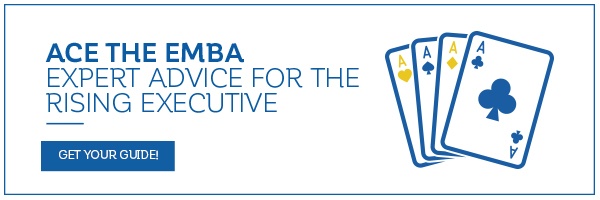
Give the adcom the reason to select you.
After demonstrating that you’re a well qualified applicant comes the biggest challenge: differentiating yourself. You must show your uniqueness and value as an individual and as an applicant in a way that is relevant to the EMBA program. Essentially, you’re giving the adcom the reason to select you out of other highly qualified, accomplished peers in similar industry, functional, and demographic groups.
While some differentiating factors might be apparent from your resume, e.g., if you work in an industry or function that is relatively underrepresented, the essays are where you can most vividly portray your distinctiveness.
There are three key avenues for differentiating yourself:
1. Distinctive Factual Points
These are the unique facts of your experience, such as industry niche, pertinent experience like managing through a global merger, special challenges like dealing with heavily regulated industries or an unusual organizational structure.
How to determine whether an aspect of your experience is a differentiating factor? Dig past the top soil. For example, say you are in consulting. It’s likely in any top EMBA program that a good percentage of students will come from that industry, and so it may not seem like much of a differentiator. But going deeper into your consulting experience for the specifics – e.g., you consult on IT strategy for the defense sector – you’ll likely find details that are differentiating, whereas general management consulting would not be.
To get the most mileage out of a differentiating factor, don’t just state the fact in your essays, but also provide illustrative detail and anecdote to truly show what is special and different about it (let the reader really see it).
2. Your Individual Perspective
Individual perspective is a way that everyone can differentiate himself. In most essays you will have to reflect on your experiences to some extent. When doing so, don’t just highlight the facts and accomplishments – identify the key learning, growth, and/or insight you gained from each change or important event; clarify your decision process when taking career steps. This individual view is inherently unique, even if the experience you are describing may seem commonplace. Do keep such perspective relevant; for maximum impact, it should align with your decision making vis-à-vis your career path and/or goals. So be selective in adding insights, learning, etc. according to that criterion.
In the essays, you can either weave this individual perspective and insight into the narrative, or present the narrative and then add a paragraph focusing on your reflection.
3. Your Goals
The goals essay will be the backbone of your application. (Rather than a specific goals essay, some EMBA applications feature a Statement of Purpose or Statement of Intent, which typically will also include some goals discussion.)
For each phase of your goals, in the essay you should discuss:
a. What you expect to do at that level,
b. How you hope to grow,
c. Most important – what you hope to accomplish (for the company and/or industry and/or market and/or consumers and/or community, etc. – this is about external, real-world impact).
Of course, the points above are not completely separated in reality; but they all should be addressed. The last point is most important because it’s what will get the adcom rooting for you.
Provide specifics: titles or positions, specific markets, likely number of people to manage, budget size or P&L responsibility, etc. Also describe how this particular step builds on your previous experience.
How do you make your goals do “extra duty” by differentiating you? Through the vision for what you want to achieve, what impact you want to have – it goes back to that last point c above. While other candidates will likely present similar goals, only you will present this specific vision. For example, if your goal is to become a senior manager at a major pharmaceutical firm, don’t just explain why this a logical and likely step. Get the reader excited about the prospect of your taking this role. Perhaps you perceive certain trends in the regulatory systems or certain production opportunities in developing regions… Being a decision-maker addressing such issues will allow you to maximize chances for your company to continue innovating and marketing new drugs.
In summary, for effective goals essays, keep three short words in mind: what, how, and why.
I hope you’ve found this series of EMBA posts helpful and that it gives you some traction as you start the application process. A key area of my expertise is working with EMBA applicants. If you would like more guidance, I would be honored to assist you – as would my colleagues at Accepted. It can be helpful to have an outside perspective to guide you through the application process. Good luck with your applications!

**Image Designed by Freepik
 By Cindy Tokumitsu, co-author of The EMBA Edge, and author of the free special report, Ace the EMBA. Cindy has helped MBA applicants get accepted to top EMBA programs around the world. She is delighted to help you too!
By Cindy Tokumitsu, co-author of The EMBA Edge, and author of the free special report, Ace the EMBA. Cindy has helped MBA applicants get accepted to top EMBA programs around the world. She is delighted to help you too!
Related Resources:
• Why MBA, free guide
• Excellent Executive MBA Admissions Advice, podcast
• EMBA Program Variety
This article originally appeared on blog.accepted.com.
Applying to a top b-school? The talented folks at Accepted have helped hundreds of applicants get accepted to their dream programs. Whether you are figuring out where apply, writing your application essays, or prepping for your interviews, we are just a call (or click) away.
Contact us, and get matched up with the consultant who will help you get accepted!
